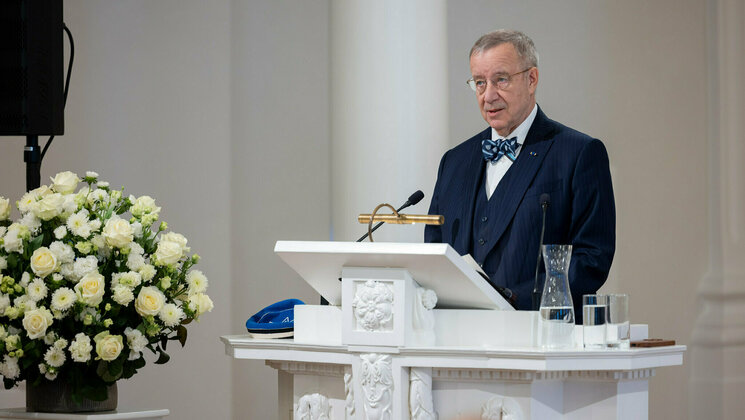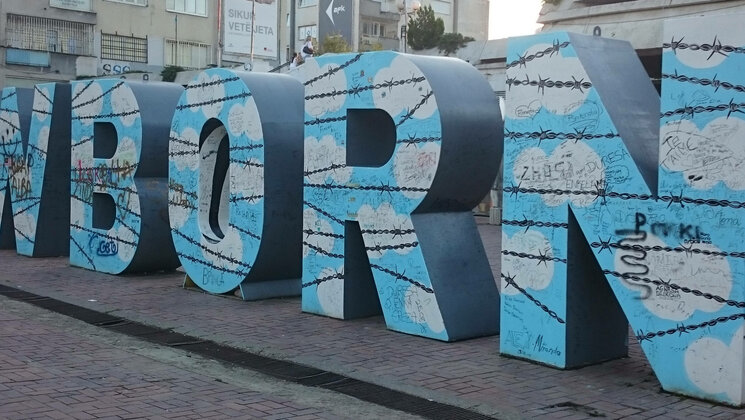-
Faculty of Arts and HumanitiesDean's Office, Faculty of Arts and HumanitiesJakobi 2 ruumid 116–121, 51005 Tartu linn, EST0Institute of History and ArchaeologyJakobi 2 51005 Tartu linn, Tartu linn, Tartumaa EST0Institute of Estonian and General LinguisticsJakobi 2, IV korrus 51005 Tartu linn, Tartu linn, Tartumaa EST0Institute of Philosophy and SemioticsJakobi 2, III korrus, ruumid 302-337 51005 Tartu linn, Tartu linn, Tartumaa EST0Institute of Cultural ResearchÜlikooli 16 51003 Tartu linn, Tartu linn, Tartumaa EST0Institute of Foreign Languages and CulturesLossi 3 51003 Tartu linn, Tartu linn, Tartumaa EST0School of Theology and Religious StudiesÜlikooli 18 50090 Tartu linn, Tartu linn, Tartumaa EST0Viljandi Culture AcademyPosti 1 71004 Viljandi linn, Viljandimaa EST0Professors emeriti, Faculty of Arts and Humanities0Associate Professors emeriti, Faculty of Arts and Humanities0Faculty of Social SciencesDean's Office, Faculty of Social SciencesLossi 36 51003 Tartu linn, Tartu linn, Tartumaa EST0Institute of EducationJakobi 5 51005 Tartu linn, Tartu linn, Tartumaa EST0Johan Skytte Institute of Political StudiesLossi 36, ruum 301 51003 Tartu linn, Tartu linn, Tartumaa EST0School of Economics and Business AdministrationNarva mnt 18 51009 Tartu linn, Tartu linn, Tartumaa EST0Institute of PsychologyNäituse 2 50409 Tartu linn, Tartu linn, Tartumaa EST0School of LawNäituse 20 - 324 50409 Tartu linn, Tartu linn, Tartumaa EST0Institute of Social StudiesLossi 36 51003 Tartu linn, Tartu linn, Tartumaa EST0Narva CollegeRaekoja plats 2 20307 Narva linn, Ida-Virumaa EST0Pärnu CollegeRingi 35 80012 Pärnu linn, Pärnu linn, Pärnumaa EST0Professors emeriti, Faculty of Social Sciences0Associate Professors emeriti, Faculty of Social Sciences0Faculty of MedicineDean's Office, Faculty of MedicineRavila 19 50411 Tartu linn, Tartu linn, Tartumaa ESTInstitute of Biomedicine and Translational MedicineBiomeedikum, Ravila 19 50411 Tartu linn, Tartu linn, Tartumaa ESTInstitute of PharmacyNooruse 1 50411 Tartu linn, Tartu linn, Tartumaa ESTInstitute of DentistryL. Puusepa 1a 50406 Tartu linn, Tartu linn, Tartumaa ESTInstitute of Clinical MedicineL. Puusepa 8 50406 Tartu linn, Tartu linn, Tartumaa ESTInstitute of Family Medicine and Public HealthRavila 19 50411 Tartu linn, Tartu linn, Tartumaa ESTInstitute of Sport Sciences and PhysiotherapyUjula 4 51008 Tartu linn, Tartu linn, Tartumaa ESTProfessors emeriti, Faculty of Medicine0Associate Professors emeriti, Faculty of Medicine0Faculty of Science and TechnologyDean's Office, Faculty of Science and TechnologyVanemuise 46 - 208 51003 Tartu linn, Tartu linn, Tartumaa ESTInstitute of Computer ScienceNarva mnt 18 51009 Tartu linn, Tartu linn, Tartumaa ESTInstitute of GenomicsRiia 23b/2 51010 Tartu linn, Tartu linn, Tartumaa ESTEstonian Marine Institute0Institute of PhysicsInstitute of ChemistryRavila 14a 50411 Tartu linn, Tartu linn, Tartumaa EST0Institute of Mathematics and StatisticsNarva mnt 18 51009 Tartu linn, Tartu linn, Tartumaa EST0Institute of Molecular and Cell BiologyRiia 23, 23b - 134 51010 Tartu linn, Tartu linn, Tartumaa ESTTartu ObservatoryObservatooriumi 1 61602 Tõravere alevik, Nõo vald, Tartumaa EST0Institute of TechnologyNooruse 1 50411 Tartu linn, Tartu linn, Tartumaa ESTInstitute of Ecology and Earth SciencesJ. Liivi tn 2 50409 Tartu linn, Tartu linn, Tartumaa ESTProfessors emeriti, Faculty of Science and Technology0Associate Professors emeriti, Faculty of Science and Technology0Institute of BioengineeringArea of Academic SecretaryHuman Resources OfficeUppsala 6, Lossi 36 51003 Tartu linn, Tartu linn, Tartumaa EST0Area of Head of FinanceFinance Office0Area of Director of AdministrationInformation Technology Office0Administrative OfficeÜlikooli 17 (III korrus) 51005 Tartu linn, Tartu linn, Tartumaa EST0Estates Office0Marketing and Communication OfficeÜlikooli 18, ruumid 102, 104, 209, 210 50090 Tartu linn, Tartu linn, Tartumaa EST0Area of RectorRector's Strategy OfficeInternal Audit OfficeArea of Vice Rector for Academic AffairsOffice of Academic AffairsUniversity of Tartu Youth AcademyUppsala 10 51003 Tartu linn, Tartu linn, Tartumaa EST0Student Union OfficeÜlikooli 18b 51005 Tartu linn, Tartu linn, Tartumaa EST0Centre for Learning and TeachingArea of Vice Rector for ResearchUniversity of Tartu LibraryW. Struve 1 50091 Tartu linn, Tartu linn, Tartumaa EST0Grant OfficeArea of Vice Rector for DevelopmentCentre for Entrepreneurship and InnovationNarva mnt 18 51009 Tartu linn, Tartu linn, Tartumaa EST0University of Tartu Natural History Museum and Botanical GardenVanemuise 46 51003 Tartu linn, Tartu linn, Tartumaa EST0International Cooperation and Protocol Office0University of Tartu MuseumLossi 25 51003 Tartu linn, Tartu linn, Tartumaa EST0
CfA: BEAR Narva Summer School 2021 for (post)graduate students
The ‘Soft Power’ of the EU and Russia in Divided Societies
July 5 – 10, 2021
Narva College, University of Tartu
Narva, Estonia
The BEAR Network invites applications from (post)graduate students to attend the BEAR 2021 Narva Summer School at Narva College, University of Tartu, Estonia, July 5-10, 2021. Summer school will take place in hybrid format where some participants and lecturers will attend the event in Narva while others will participate online. A summary of summer school activities can be found below.
Full-time thesis students enrolled in a (post)graduate degree program at a BEAR partner university are invited to apply to attend the summer school. Exceptional advanced undergraduate students at a BEAR partner university who are under the supervision of a BEAR network member are eligible as well.
COVID-19 pandemic related restrictions
Participation in person in Narva will depend on the travel restrictions applied at the time of the travel by Estonian state authorities and on the restrictions applied by home country of a participant. The organisers will reserve the right to move all participation into online format based on changing COVID-19 pandemic situation and travel restrictions.
Summer School Description
Since the beginning of state- and regime transformations in post-communist Central and Eastern Europe, a central issue of democratic governance and regional security has been the design of inclusive democratic institutions and policies. The existence of various minorities, including those that have kin-states (Russia), has made this task particularly urgent. A rich body of scholarship has emerged about these questions, influenced significantly by Rogers Brubaker’s model of the “triadic nexus” between what he calls nationalizing states, national minorities, and external homelands. Most studies have also recognized the significance of European institutions, and some have adopted what David Smith (2002) called a “quadratic nexus” to include the European framework. In recent years, the question of the overlapping influences of both the EU and Russia in the region has attracted significant scholarly attention. The interplay of EU’s and Russia’s “soft power” produces tensions, but also engenders new identities among borderland communities.
This Summer School, organized the Jean Monnet BEAR Network (“Between the EU and Russia: Dimensions of Diversity and Contestation”) will address the dynamic of identity and the interplay of “soft powers”, paying close attention to the social and ethnopolitical movements and contestations in the region. Focusing on this zone of contact and contestation between the EU and Russia, the summer school’s main questions are the following:
- How does the “soft power” of the EU and Russia affect local perceptions of belonging and formation of identities of various minorities in the borderlands?
- How does EU integration or Russia’s attempts to reclaim the “compatriots” affect protest dynamics and the likelihood of conflict?
- To what extent are the claims and dynamics of social movements in one state in the region affected by those in neighbouring states, and with what ramifications for European integration?
- What are the similarities and differences in how societies in the EU, Russia and neighbouring countries cope with domestic social change, external threats and global challenges?
Eligibility
The applicant must:
- Be a full-time thesis student enrolled in a (post)graduate degree program at a BEAR partner university (exceptional advanced undergraduate students can also apply - University of Tartu is a member)
- Be approved by their supervisor to take part in the summer school
Value
For those able to travel to Narva for summer school, scholarships will be provided on competitive basis. Travel, accommodation, and per diem for up to 8 days will be sponsored by the BEAR Network. No scholarships are available for online participants.
Deadline
All applications must be received by April 20, 2021.
How to apply
The following documents must be emailed to Dr. Kristina Kallas, kristina.kallas@ut.ee:
- Motivation letter (2 pages maximum). Please indicate in your letter whether circumstances permitting you are willing to travel to Narva.
- Short CV (2 pages maximum)
- Estimated budget in case of travel to Narva
- Brief e-mail from the supervisor confirming their support
Requirements
- Selected participants are expected to attend all summer school sessions
- Selected participants will be asked to record a short video reflection for the BEAR website
- Selected participants will receive a certificate of participation from the BEAR Network
Click here to download the Call for Applications.
Summer school organiser:
Dr. Kristina Kallas
Narva College, University of Tartu
kristina.kallas@ut.ee
maili.vilson@ut.ee
Read more similar news






